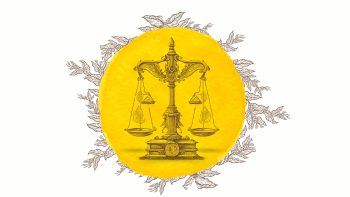Career struggles of young female lawyers

According to Justice Audit Bangladesh, as of December 2016, there were 57,530 enrolled advocates in Bangladesh, of which only 7,309 were female. This vast disparity in numbers is a rather apt representation of the gruesome reality of pursuing law as a female in Bangladesh. Stereotypes and misogynistic perceptions have meant that not only are women deterred from entering the profession, but the few that do are faced with a host of unfair challenges that make it difficult for them to gain professional success at par with their male colleagues.
The first hurdle that many female lawyers experience from their first moments in the court building is bias. When asked about such prejudices, Samira*, an apprentice lawyer working in the District and Session Judge's Court, Chittagong said, "Although equality is enshrined in our constitution, we do live in a patriarchal society."
Speaking from her own experiences and from what she has heard and seen, Samira continues, "The clients, both male and female, oftentimes prefer opening up to male lawyers rather than to female lawyers. They tend to think that male lawyers are far more knowledgeable and approachable, and they look down upon us."
Contemplating the reasoning behind these biases, Barrister Sweety Ahmed, an advocate of the District and Sessions Judge's Court, Dhaka, and a lecturer at the London College of Legal Studies (South), opines, "Clients feel that men have more experience than women because they assume women are involved in other activities besides their career, such as looking after their homes and their children. Because of this perception, many clients believe that men will be able to work harder."
Alena Khan, a senior advocate at the Supreme Court of Bangladesh who also runs the Bangladesh Human Rights Foundation, reaffirms this point, saying, "When I started out, my abilities were doubted. A lot of people used to think that I would not be able to handle challenging issues or high-profile cases because I was a female."
The consequence of these misconceptions is that female lawyers are assigned far fewer cases or might not be approached by as many clients as their male colleagues.
Advocate Shathika*, a practitioner at the High Court Division of the Supreme Court of Bangladesh, highlights some of the ways the systemic injustices make law a difficult field for women, "The decision of who gets seats or rooms at the High Court rests upon the bar association. I have heard them say that women don't practice enough or are not lawyers of a high enough stature to deserve seats, so we are often overlooked during this process. This happened to me when I was lobbying for a seat. Male lawyers, who were far junior to me, were selected instead."
"Additionally, when it comes to bar association elections, female lawyers are rarely ever appointed to high posts with significant responsibility. Their positions are kept limited to that of Cultural Secretary or Assistant Secretary," adds Shathika.
Rumana Sultana Prome, a 31-year-old lawyer practicing at the Gazipur District and Sessions Judge Court, for example, says, "I have faced prejudicial behaviour in my everyday practice. People say and do things that may not appear to be so but are still disrespectful or offensive"
Moreover, there are exclusionary schemes in the system that prevent women from gaining promotions or building their careers.
Khushnud Raisa Ushika, a young advocate at the District and Session Judge's Court, Chittagong, says, "Despite equal or greater effort, female lawyers are not given the same pay as our male counterparts. While collaborating on cases, our contributions are overlooked or credited to our male colleagues instead."
The biases against young female lawyers also manifest in other forms of subtle discrimination like thinly veiled, disparaging comments and the expectation of them to conform to conservative social norms while speaking.
Samira elaborates, "This is a profession where you need to be straightforward with what you say, but in the case of women when you use terms like 'rape victim', 'sperm count', or other explicit technical terms in front of the judges or other lawyers, they consider you to be ultra-modern to be accepted. They give us this sort of accusatory look as if to ask, why are you so insolent? This does not apply to male lawyers."
Young female lawyers also often fall prey to sexual misconduct in the workplace. Samira speaks at length about her experience on the matter, "A lot of my seniors are very cooperative and friendly, but there are also those who consider me to be someone they can chase after. There are those who develop a romantic interest in me. If they can gather that I am trying to ignore them and I don't reciprocate their feelings, it triggers aggression from them, and they badmouth me to my colleagues behind my back."
Sweety adds, "I have noticed that sometimes if a woman wants to aim for a high position or wants to advance in her career, she gets inappropriate offers."
In courtrooms and corridors, in the common spaces and cafeterias where clients and spectators are present, female lawyers have to put up with crass comments, mockery, and harassment simply because they are female and chose to work in a male-dominated field. "The first time I walked into the Judge court, I felt people staring at me like they had seen an alien. It made me very uncomfortable," says Sweety.
The lack of proper regulatory bodies capable of enforcing anti-harassment rules at the courts means that perpetrators often get away without any accountability. Samira laments, "While we were still in university, the male students had the fear that if they mistreated their female classmates, they might get rusticated or punished by the authorities. This is not the case in the court building. The only thing you can do is file a suit or a case against the person causing you distress, but it is not possible to do that in the case of every single person."
The legal profession has long been characterised as being unfit for women. Without the proper cooperation and understanding from people in the personal realm of their lives, the path to success for these female lawyers becomes exponentially harder.
Prome says, "A number of social, religious, professional, and ideological factors often stand in the way of women becoming lawyers. Nothing different happened in my case; my family didn't want me to pursue this profession."
"One needs to spend a lot of time in court and a lot of time in the law chamber. Partners who do not understand the demands of the profession can create problems. My husband belongs to the same profession and understands the work we have to do. But others with less understanding partners have suffered. If a lawyer's husband feels that his wife shouldn't talk to other men or if he is possessive of her, then that creates problems," says Sweety.

Young female lawyers who have children face the added difficulty of balancing their careers with caring for their children. The lack of day-care facilities and substantial support from their workplace presents a major challenge for young mothers who practice law.
Advocate Kazi Nazma Begum of the Supreme Court of Bangladesh describes her struggles in the years following her son's birth, "Oftentimes, my senior would task me with a hearing, and for that, of course, I'd have to read the file and study the case. But with a baby that got sick often, how could I concentrate on that? Putting that sort of effort at home and then going to work the next day became an impossible matter. I had to choose one, and I decided that my child was my priority."
However, even for women who manage to find a way to balance their maternal responsibilities with their career aspirations, things are not easy. Prome says, "I have faced questions many times about why I returned to practice despite having small children, with people looking down upon me for not staying at home fully. Unfortunately, there really isn't any support system in place to help women who choose to have children."
It is possible, too, that colleagues and clients might be more hesitant to give these young female lawyers work because they don't believe that they will be able to handle the responsibilities of both their work and their children. Male lawyers with young children are rarely, if ever, faced with the same questions and prejudices.
It is these difficulties - the entrenched biases, the discrimination in recognition and pay, the lack of support, coupled with responsibilities towards one's child – that, in many cases, push women out of the legal profession. A result of this is that many women opt instead for corporate or academic careers.
Advocate Maksuda Khanom of the Supreme Court of Bangladesh, who now works in the legal division of Midland Bank PLC, shares, "I decided that if I went for a job instead, my work would be limited to certain hours and I would be able to spend more time taking care of my child. But I still do miss practicing. I feel that I could have done very well if I had continued with it."
Alena Khan states, "While strides have been made in terms of gender equality, there is still room for improvement. Some organisations, law firms, and courts have formulated gender equality policies. However, the proper implementation of these policies is lacking. Even though anti-harassment committees exist, they are not always effective."
On possible solutions to these issues, she opines, "Mentoring opportunities for female lawyers need to be expanded to encourage them to enter and succeed in the profession. The introduction of flexible working hours would allow women to easily maintain a balance between family and work life."
Maksuda adds, "If the courts could take the initiative to provide daycare facilities for children, it would be of great help to young mothers."
With many women having done exceedingly well for themselves in this profession, Sweety Ahmed and many others are optimistic about progress.
However, Shathikha feels disillusioned. "The reality is that unless there is a significant change in the societal outlook towards the role of women in law, there will be no meaningful improvement in the treatment of female lawyers. People, particularly our male colleagues and those who seek legal counsel from us, need to let go of the backdated perceptions regarding our professional capabilities being tied to our gender. We are just as equipped to act as bearers of justice as our male counterparts, and it is high time that we start being treated as such."
Leading the way and setting the trend for female emancipation, women in law have, over the decades, made great contributions to the legal profession. However, stories of triumph always come with tales of strife and hardship. And in a society like ours that is still far from breaking free from its patriarchal shackles, without significant systemic changes in the legal workplace, the stairway to success will continue being tremendously steep for those young women who aspire to be great lawyers.
*Names have been changed upon request.

 For all latest news, follow The Daily Star's Google News channel.
For all latest news, follow The Daily Star's Google News channel. 











Comments